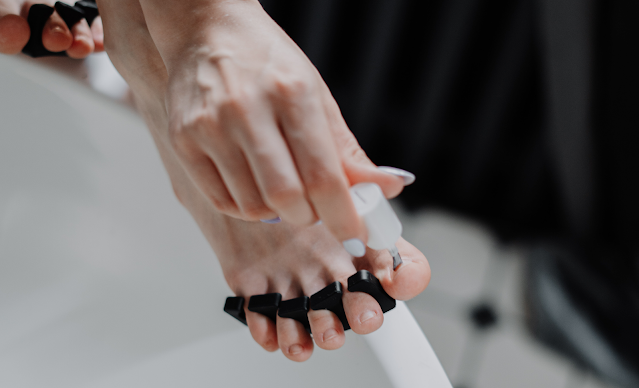Nail Care Routine - Cleaning Finger Nails
Start by removing any nail polish or artificial nails if you have them.
Use a nail brush or an old toothbrush with a mild soap or shampoo to gently scrub your nails and surrounding skin. Make sure to get into the crevices and under the nails.
Use warm water to rinse your nails and hand thoroughly.
An orange stick or cuticle pusher can be used to gently push back your cuticles.
Use a nail file or emery board to shape your nails to the desired shape.
Apply a moisturizer or oil to your nails and cuticles to keep them hydrated.
If you have any fungus, discoloration or any other serious nail issues, it's best to seek a medical professional or have a proper diagnosis before trying any home remedies.
It's important to clean your nails regularly to prevent the buildup of dirt and bacteria, which can lead to infection. Try to clean your nails at least once a day, especially after activities that may expose them to dirt or grime.
Nail Care Routine - Cleaning Foot Nails
- Keep feet clean and dry: Make sure to wash your feet daily and dry them thoroughly, especially between toes to prevent fungal infections.
- Trim nails straight across: Use a toenail clipper or scissors to trim your toenails straight across, avoid rounding the edges, which can lead to ingrown toenails.
- File nails: Use a nail file to smooth the edges of your toenails after trimming them.
- Moisturize your feet: Use a moisturizer or lotion to keep your feet and toenails hydrated.
- Wear comfortable shoes: Make sure to wear shoes that fit properly and provide enough room for your toes to move freely.
- Check for signs of infection: Keep an eye out for signs of fungal or bacterial infection, such as discoloration, thickening, or foul odor.
- Use antifungal sprays or powders: If you have a history of fungal infections, use antifungal sprays or powders to help prevent future infections.
- Soak your feet: Soak your feet in warm water with Epsom salt or vinegar to soften the nails and cuticles.
- Take care of your overall foot hygiene, as it directly affects your toenail health.
Lastly, visit a podiatrist if you have any persistent toenail issues, such as an ingrown toenail or a fungal infection, they can provide appropriate treatment.
Nail Care Routine - Home Remedies For Healthy Nails
- Olive Oil and Lemon Juice: Mix equal parts of olive oil and lemon juice, then massage the mixture into your nails and cuticles. Then leave it for 10 minutes before rinsing off with warm water.
- Coconut Oil: Massage coconut oil into your nails and cuticles before going to bed. For best results leave it for overnight.
- Lemon Juice: Soak your nails in a bowl of lemon juice for 10-15 minutes to strengthen and whiten them.
- Apple Cider Vinegar: Mix equal parts of apple cider vinegar and water, then soak your nails for 10-15 minutes.
- Biotin: Biotin is a B-vitamin that helps to strengthen nails, you can take it as a supplement or include biotin-rich foods in your diet such as eggs, nuts, and seeds.
- Aloe Vera: Aloe vera gel is a natural moisturizer that can help to hydrate your nails and cuticles. Apply this gel to your nails and massage ita.
- Garlic: Crush a few cloves of garlic and mix it with coconut oil or olive oil. Apply the mixture on your nails and leave it on for 10-15 minutes before rinsing it off with warm water.
- Tea Tree Oil: Tea tree oil has anti fungal and antiseptic properties, it can help to prevent and treat fungal infections of the nails. Mix a few drops of tea tree oil with coconut oil or olive oil and massage it into your nails and cuticles.
It's worth noting that home remedies are not always the best solution for nail care and if you experience any serious nail problems it's best to consult a doctor.
Nail Care Routine - How To Prevent Nail Damage
- Keep nails dry and clean: Moisture can lead to the growth of fungus and bacteria, which can cause damage to nails. Keep your nails dry and clean to prevent infection.
- Avoid biting nails or picking at cuticles: Biting nails can weaken them and make them more prone to breakage, and picking at cuticles can lead to irritation and infection.
- Use gloves when cleaning or doing activities that may expose your nails to harsh chemicals: Gloves can protect your nails from damage caused by cleaning products, detergents, and other chemicals.
- Avoid using harsh nail treatments: Avoid using nail hardeners, which can make nails more brittle, and limit the use of acrylic or gel nails, which can damage the natural nails over time.
- Maintain a healthy diet: Include biotin and other nail-healthy nutrients in your diet, such as lean protein, iron, zinc, and vitamins C and D.
- Hydrate your nails: Keep your nails moisturized by applying a nourishing oil or cream to your nails and cuticles.
- Be gentle when filing your nails: Use a file or emery board to shape your nails, but avoid over-filing, which can weaken nails.
- Trim your nails regularly: Keep your nails trimmed to prevent them from becoming too long, which can increase the risk of breakage.
- Get early treatment for fungal infection: If you notice discoloration, thickening or any other symptoms of fungal infection, seek medical help as soon as possible.
Remember to be consistent and patient, it takes time to grow healthy and strong nails, but with proper care, your nails will be less prone to damage and will look better over time.



Post a Comment